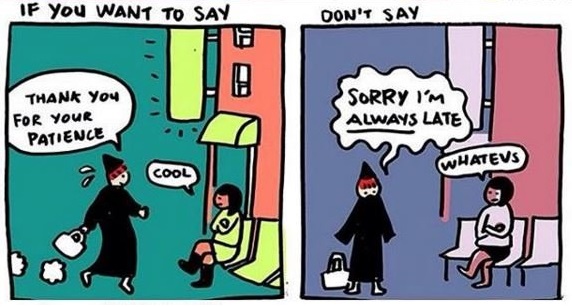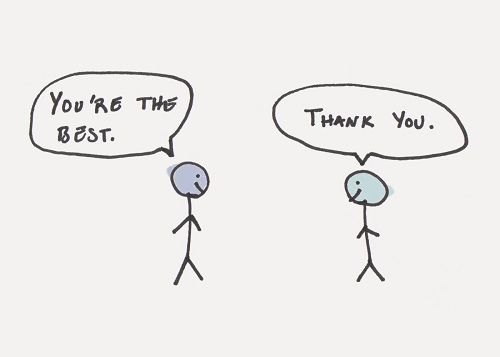What We're Reading Now
Learning When and How to Say Thank You
8 March 2016
Allison read Make Your Life Better by Saying Thank You in These 7 Situations by James Clear and reflected on how our relationships would change if we were able to receive compliments and have more empathetic responses.
Tags: allison read, communication, empathy, gratitude
Last month I wrote a post called Stop Apologizing When Thank You is a Better Choice. In the five years I’ve been blogging, I think this may be the most popular post I’ve ever written. People talked about it on Facebook, Twitter, and LinkedIn. They brought it up when I'd see them around town and tell me about how their recent interactions felt better after thanking people more and apologizing less. Something about illustrator’s Yao Xiao seven cartoons seemed to really speak to people.

I think James Clear’s article, Make Your Life Better by Saying Thank You in These 7 Situations, may resonate with people in a similar way. He provides specific examples of what to say (and what not to say) in each of these instances:
- When you’re receiving a compliment.
- When you’re running late.
- When you’re comforting someone.
- When you’re receiving helpful feedback.
- When you’re receiving unfair criticism.
- When someone gives you unsolicited advice.
- When you’re not sure if you should thank someone.
I'm not sure why many of us have trouble receiving a compliment. It could be that we simply don't know how. Perhaps we feel we're not deserving or that we'll seem as though we lack humility in front of others. However, I like what Clear has to say on this topic. "There is something empowering about fully accepting a compliment. When you deflect praise, you can’t really own it. When you just say 'Thank You,' you let the weight of the compliment sink in and become yours. Saying 'Thank You' gives your mind permission to be built up by the compliments you receive." I believe most people who give us compliments would be delighted to know the good feedback could make such a positive difference in our lives.

I also like these two examples from Clear:
Example: Your co-worker’s mother passed away recently.
- Instead of: "At least you have a lot of fond memories to hold onto."
- Try saying: "Thank you for sharing that with me. I know this is a hard time for you."
Example: “I bought your product last week and it already broke. I am not happy with this experience."
- Instead of: "How did you use it? We made it very clear in our terms and conditions that the product is not designed to work in certain conditions."
- Try saying: "Thank you for sharing your thoughts. Please know we are committed to becoming better. Can you share more details about the issue?"
Thank you, James Clear, for helping us learn how to say "thank you." With this advice in mind, I think more of us will be able to savor a good compliment, graciously acknowledge the person giving the compliment, and then get through some of life’s trickier communication moments, too.







Comments
Our Comment Policy:
Our blog posts are only half of the conversation. What our readers have to say is equally important to us, and we're grateful for all the comments that continue the dialog.
To ensure that the discussion here is as useful as possible to all of our readers, please be respectful of our contributors and refrain from harassing, threatening and/or vulgar language. We reserve the right to screen and remove any comments from the site. If you have a question about a comment or want to discuss our policy, please contact us. We'll talk it over.
There are no comments for this entry yet.